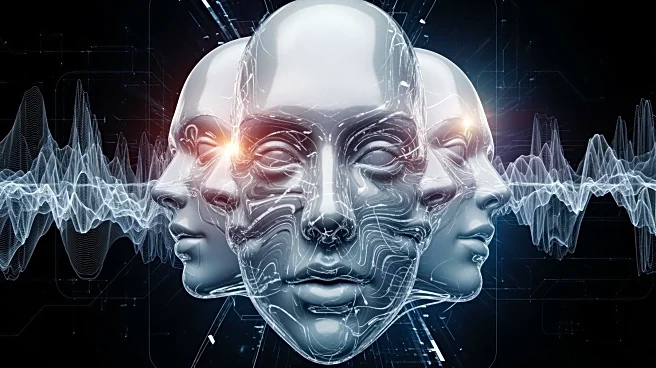What's Happening?
The proliferation of AI-generated videos featuring celebrities, both living and deceased, has raised significant legal and ethical questions. These videos, created using advanced AI tools like OpenAI's Sora 2, depict famous figures in various scenarios
without their consent. The technology allows for the creation of realistic videos that can portray celebrities in unflattering or fictional situations, such as Michael Jackson stealing food or Marilyn Monroe as a TSA agent. While some celebrities, like Mark Cuban, have embraced the technology, others, including the estates of deceased figures like Bob Ross, have expressed concern over unauthorized use of likenesses. Legal actions are being considered to address these issues, as the technology challenges existing copyright laws.
Why It's Important?
The rise of AI-generated videos poses a threat to the control celebrities and their estates have over their public images. This technology could disrupt the entertainment industry by blurring the lines between reality and fiction, potentially leading to reputational damage and financial losses for those depicted. The legal landscape is also being tested, as current copyright laws may not adequately address the complexities introduced by AI. The situation highlights the need for updated regulations to protect individuals' likenesses and ensure ethical use of AI in media. The outcome of ongoing legal challenges could set important precedents for the future of AI in entertainment.
What's Next?
As the legal battles unfold, stakeholders in the entertainment industry are closely monitoring the situation. Companies like Disney and Warner Bros. have already initiated lawsuits against AI firms like Midjourney, alleging copyright infringement. These cases could lead to significant financial penalties and influence how AI tools are developed and used in the future. Meanwhile, AI developers may need to implement stricter controls and opt-in policies to prevent unauthorized use of likenesses. The industry is at a crossroads, and the decisions made in the coming months could shape the integration of AI into media and entertainment.
Beyond the Headlines
The ethical implications of AI-generated content extend beyond legal concerns. The technology raises questions about privacy, consent, and the potential for misuse in creating misleading or harmful content. As AI becomes more sophisticated, the ability to distinguish between real and fabricated media will become increasingly challenging, potentially eroding public trust in digital content. This development calls for a broader societal discussion on the responsible use of AI and the establishment of ethical guidelines to govern its application in creative industries.

















